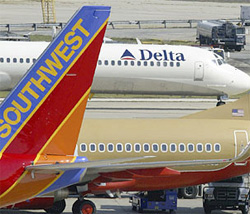 Is this fallout from the Northwest-Delta merger and all the associated flight cutbacks? Maybe.
Is this fallout from the Northwest-Delta merger and all the associated flight cutbacks? Maybe.
The Dallas Morning News is reporting that Southwest Airlines is to begin service in Minneapolis-St. Paul.
Update 3:45 p.m. – The company has now issued a news release, which says:
“One of the most frequent questions I have been asked over the years is, ‘When is Southwest Airlines coming to Minneapolis-St. Paul International Airport?’ Today, I can finally give people the answer we have been working toward: ‘Very, very soon.’ I am confident Southwest will receive overwhelming community support for its new service to the Twin Cities,” said Executive Director of Metropolitan Airport Commission Jeff Hamiel. “The Metropolitan Airports Commission stands ready to assist the airline in establishing and growing service to Minnesota.”
Initially, flights from here will go only to Chicago Midway, a route that AirTran flew before it went out of business. (Correction: Dropped route. Not out of business.)
It marks Southwest’s first new city since it re-entered the San Francisco market in August 2007. Upstart airlines have had a difficult time making inroads into the market because Northwest Airlines has passenger loyalty and is the hometown airline. But by March, Northwest Airlines will be gone, and the airline that replaces it will be based in Atlanta.
I wrote about the possibility of Southwest coming into the market when the Northwest-Delta merger was announced, via an interview with aviation industry expert Dan Petree at Embry-Riddle. He didn’t think it would happen and he sized up the Southwest business strategy:
They don’t take on people just for the sake of competing. They take people head-on because they think they can get market share and sustain it. They look for available gates at underserved airports, the right mix of business and leisure travel, they look to establish brands in markets where the existing airline appears to have a weakness. The last head-to-head competition was AirTran’s entry into Milwaukee. It was resisted by Midwest but at the end of the day it looks to have been successful by AirTran, capturing a large share of the Milwaukee market. They did that because it made sense for them and they perceived a weakness. And Milwaukee is close enough to Chicago that it wasn’t considered a major market anyway. Southwest doesn’t go head-to-head against major established networked carriers in heavily utilized airports.
What does this do to fares for Twin Cities travelers? They should go down. While AirTran was flying the route in March, a roundtrip ticket to the same destination was $114. Today Northwest charges $395 for the same flight.
In addition, a recent survey, as reported by the Associated Press, showed fares in the Twin Cities have jumped 17 percent in the last year. There were exceptions to the trend nationwide. Cities served by Southwest had lower overall fares. Take Denver, for instance:
Yet fares in Denver are up only 4 percent over the past year. The reason? Southwest Airlines has been adding flights as United Airlines and Frontier Airlines pull back. By Nov. 2 Southwest plans to have 115 daily flights out of Denver, a nine-fold increase from mid-2007.
Southwest Airlines has already been taking on Northwest head-to-head with some success. In Detroit, a Northwest hub, the airline has flown 19 flights a day. While other carriers are bleeding dollars, Southwest has been making money by locking in fuel prices. It makes a profit and has almost $6 billion in cash.
Says the Detroit Free Press:
With a hedge, the airline enters into a contract with a bank or other financial services firm. The airline bets oil prices will go up; the other side bets they will go down. The loser must pay the difference to the other party.
With oil hovering about around $100 a barrel, Southwest has come out on top. For 2008, it has locked in the price for about 70% of its jet fuel based on oil priced at $51 per barrel. For 2009, it has locked in 55% of its jet fuel based on that same price.
Southwest is “more protected” than any other airline if oil prices remain around where they are now, according to Stuart Klaskin, an aviation analyst at KKC Aviation Consulting in Coral Gables, Fla.
I suppose in the long run this is bad news for St. Cloud, an airport that’s been getting big enough — coupled with a metropolitan area that’s spreading far enough — to be a typical Southwest-type location.
As long as we’re on the subject of Midway, a fairly significant development was lost in the news hubbub on Tuesday. Midway Airport is on track to become the first privatized big-city airport.
